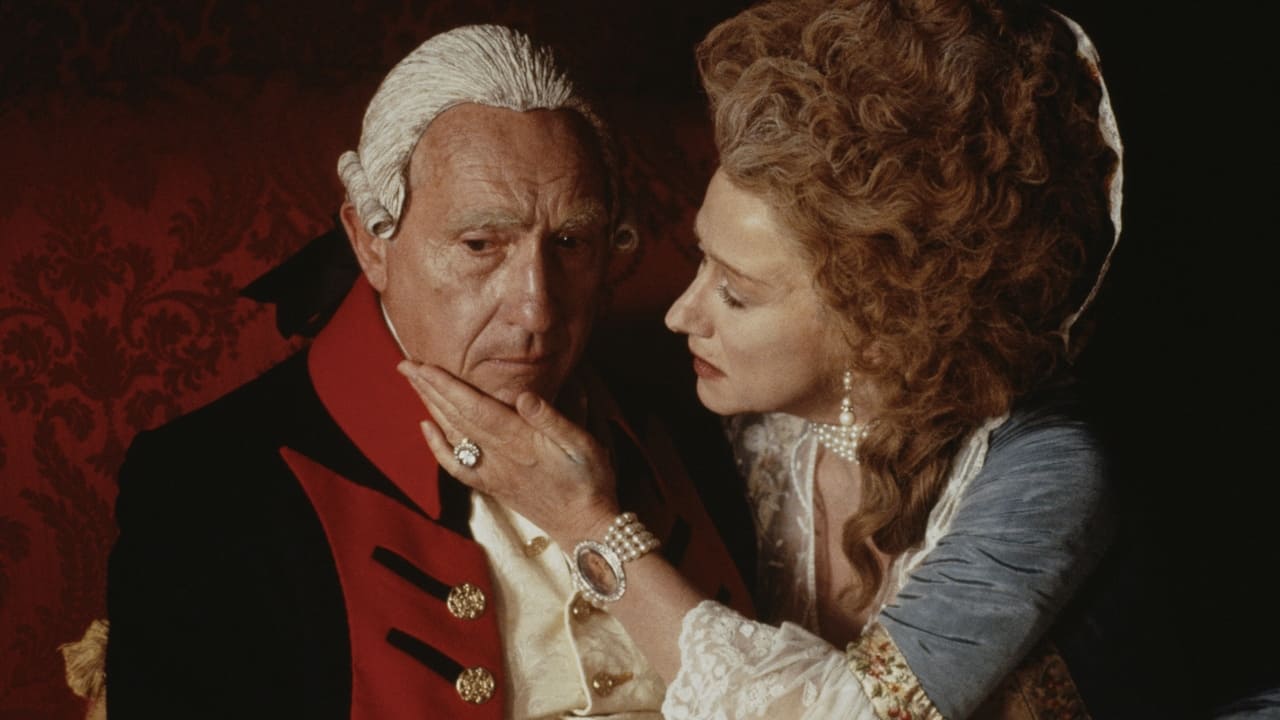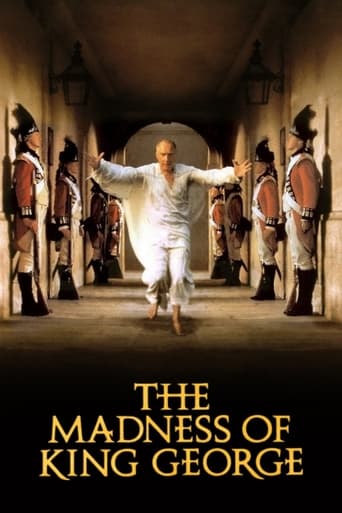

Too many fans seem to be blown away
... View MoreThis movie feels like it was made purely to piss off people who want good shows
... View MoreThe thing I enjoyed most about the film is the fact that it doesn't shy away from being a super-sized-cliche;
... View MoreThis is a dark and sometimes deeply uncomfortable drama
... View MoreA moving exploration of mental illness masquerading as a costume drama. THE MADNESS OF KING GEORGE tells the story of George III, Britain's 'Mad King', whose life was beset by repeated ill health until his son, the Prince Regent, finally ruled in his stead.This is far from your usual costume drama (something like THE YOUNG VICTORIA), because it's written by and based on a stage play by Alan Bennett, who immediately brings events closer to home. He focuses on characters, personalities and feelings throughout, and isn't so interested in the pomp and splendour that other directors might have favoured. Instead, this is a glorious rebellion put on film, showing with childlike glee the way one man fought back against the social constraints of his era.Of course, that's not to say that this isn't an authentic-looking film; the costumes are splendid, the locations even more so, and the cast of British thesps are all very good. Nigel Hawthorne, in particular, gives one of his best-remembered performances (he'd played the same role on stage many times, which is why he's so confident in the part).
... View MoreI rarely give out praise for a film, but here is one that I have enjoyed watching the second and third time. Excellent story, rooted in reality, well crafted, great acting by the world's best, great and accurate costumes, comportment, sets, historical accuracy.The story guides you to the seminal moment when George is reading King Lear with the Minister from government and regains his sanity in one of the finest moments in cinematography, which could only have been portrayed, ironically enough, by elite stage acting. Why is this so? Because the Royal Family would have carried themselves like stage actors back in the 18th century. Whether the directors and actors knew this or it simply came together, it's absolutely brilliant.In short, kudos. I give only 9 out of 10, because I thought the machinations portrayed in Parliament and of the Prince were a little exaggerated.
... View MoreBased on the play, this is quite a good period drama of a new king of England that has an almost unexplainable madness. I did fall asleep somewhere, probably when Sir Ian Holm was helping cure the king, but what I did see of this film, based in the time of The French Revolution was good. Basically George III (BAFTA winning, and Oscar nominated Nigel Hawthorne) has recently been crowned, and not long after starts a dementia, and becomes more alive and more politically marginalized. All are concerned, especially wife Queen Charlotte (Oscar and BAFTA nominated Dame Helen Mirren), well, unless you count the stupid Prince of Wales (Rupert Everett). The only person who may be able to help the king return to normal "what-what" is Dr. Willis (BAFTA nominated Holm). Also starring Rupert Graves as Greville, Amanda Donohoe as Lady Pembroke, Green Wing's Julian Rhind-Tutt as Duke of York, Julian Wadham as Pitt, Jim Carter as Fox and Geoffrey Palmer as Warren. I can see why Blackadder picked on this period with Prince George in Blackadder the Third. It won the Oscar for Best Art Direction-Set Decoration, and it was nominated for Best Writing, Screenplay Based on Material from Another Medium, and it won the BAFTAs for Alexander Korda Award for Best British Film and Best Makeup/Hair, and it was nominated for Anthony Asquith Award for Film Music for George Fenton, Best Cinematography, Best Costume Design, Best Editing, Best Production Design, Best Adapted Screenplay, Best Sound, David Lean Award for Direction for Nicholas Hytner and Best Film. Rupert Everett was number 39 on The 50 Greatest British Actors, Amanda Donohoe was number 38, and Dame Helen Mirren number 7 on The 50 Greatest British Actresses, and Mirren was number 5 on Britain's Finest Actresses. Very good!
... View MoreCertainly the American tradition casts "German Georgie" in a far different light than the real life English King who for all his foibles was much loved at home. George III enters upon his mania to the dismay of the royalist faction but the very threat of losing the throne to his erratic son the dissipated Prince Regent and future King George IV (the English King George IV to be distinguished from His Majesty's weakling American knock-offs George IV The Bush and George IV jr) prompts a recovery."I seem more myself," remarks old King George introspectively as he puts aside a reading from Shakespeare, "I think I've learnt how to seem." Yet George III did much to shape the American image of what a ruler should be. He's so moral that the Queen blames the regrettable illness on his refusal to take mistresses. "There are model farms and factories," George Rex tells the Royal Family, "we must be a model family." On American independence, George IV decides, "It's an idea we must get used to." Will that ever happen? See the film!
... View More